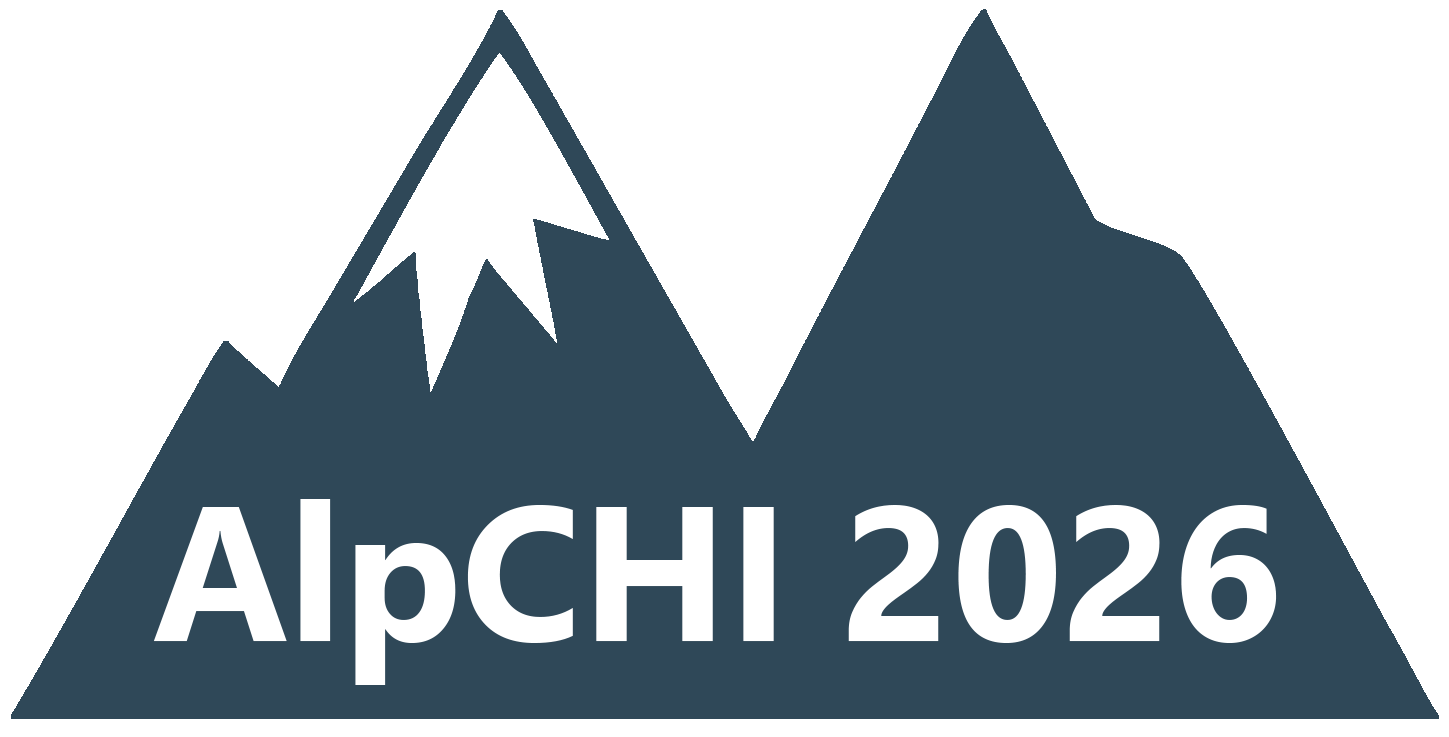Theme: Interaction in Nature, in the Wild, at the Summit
We are thrilled to invite you to the inaugural AlpCHI, the HCI conference dedicated to elevating Human-Computer Interaction in the spirit of the Alps. This year’s theme — Interaction in Nature, in the Wild, at the Summit — calls for contributions that embrace nature, wildness, remoteness, and the extreme. AlpCHI seeks to shape the landscape of Alpine HCI: resilient, mindful, sustainable, and deeply connected to people and places. We welcome Short Papers accompanied by a demonstration or showcase, because we believe at AlpCHI ideas should be experienced, not just described. Researchers, designers, artists, and practitioners worldwide are warmly invited to contribute — you do not need to live and work in the Alpine region to participate! AlpCHI also invites all relevant research in HCI beyond the theme as well.
Topics of Interest
Whether you explore mindful technologies, sustainable innovations, or new social and local connections through technology, AlpCHI is the place to share your novel HCI ideas and experiences.
We encourage submissions across a broad range of topics, including (but not limited to):
- Elevating HCI: New perspectives on interaction shaped by alpine challenges and inspirations
- The Landscape of Alpine HCI: Emerging trends, practices, and designs rooted in mountainous regions
- HCI in the Wild / HCI in Nature: Interactions beyond the lab, in forests, on glaciers, lakes, summits or cities
- HCI at the Top: Interaction design for remote, high-altitude, or extreme environments
- Mobility: Travel, accessibility, remote interaction, and interaction “on the go” in mountainous regions
- Health and Wellbeing: Technologies supporting physical, mental, and social wellbeing in outdoor and alpine contexts
- Sports and Games: Interaction designs for outdoor activities, mountain sports, and playful experiences
- Evaluation: Methods and challenges of assessing technologies in wild, unpredictable, or remote settings
- Communication, Collaboration, and Social Interaction: How we connect, collaborate, and communicate in and across “wild” places
- Technology, Adaptation, and Everyday Life: How we design, adapt, and experience technologies within all environments not limited to the theme.
Note: We encourage experimental, interdisciplinary, artistic, and thought-provoking submissions.
Submission Details
| Format | Short Paper (6 pages max., excluding references), using the ACM Conference Proceedings Primary Article Template in two-column format (LATEX/Overleaf: \documentclass[sigconf, review]{acmart}, Word). Submissions must be anonymized and use ACM Reference Formatting. |
| Additional Requirements | Your submission must be original; it cannot be published or under concurrent review elsewhere. The paper must be accompanied by a demonstration or showcase (live or pre-recorded video). |
| Review Process | Double-blind peer review. |
| Publication | Accepted papers will be published Open Access in the ACM Digital Library through the ACM Production System (TAPS). |
| Submission Portal | EasyChair: https://easychair.org/my/conference?conf=alpchi26 |
Important note to authors about the new ACM open access publishing model
ACM has introduced a new open access publishing model for the International Conference Proceedings Series (ICPS). Authors based at institutions that are not yet part of the ACM Open program and do not qualify for a waiver will be required to pay an article processing charge (APC) to publish their ICPS article in the ACM Digital Library. To determine whether or not an APC will be applicable to your article, please follow the detailed guidance here: https://www.acm.org/publications/icps/author-guidance.
Further information may be found on the ACM website, as follows:
- Full details of the new ICPS publishing model: https://www.acm.org/publications/icps/faq
- Full details of the ACM Open program: https://www.acm.org/publications/openaccess
- Please direct all questions about the new model to icps-info@acm.org.
Important Dates
| Full Paper Submission | |
| Notification of Acceptance | December 2, 2025 |
| Camera-ready Deadline | December 12, 2025 (Anywhere on Earth) |
| Conference Dates | March 01 – March 05, 2026 |
Questions?
If you have any questions, please don’t hesitate to contact us: papers@alpchi.org
Program Committee
- Christine Bauer (Paris Lodron University Salzburg)
- Hugo Brument (TU Wien)
- Nitzan Cohen (Free University of Bozen-Bolzano)
- Antonella De Angeli (Free University of Bozen-Bolzano)
- Alexandre de Masi (University of Geneva)
- Ralf Dörner (RheinMain University of Applied Sciences)
- Tiare Feuchtner (University of Konstanz)
- Ujwal Gadiraju (Delft University of Technology)
- Christian Geiger (University of Applied Sciences Düsseldorf)
- Adelaide Genay (University of Melbourne)
- Jens Gerken (TU Dortmund)
- Michael Haller (Free University of Bozen-Bolzano)
- Bruno Herbelin (EPFL)
- Jean-Baptiste Labrune (MIT Media Lab, Human-IST, Uni.fribourg)
- Denis Lalanne (Human-IST, University of Fribourg)
- Daniel Leithinger (Cornell University)
- David Lindlbauer (Carnegie Mellon University)
- Pavel Manakhov (Lancaster University)
- Florian Mathis (University of Applied Sciences of the Grisons)
- Florian Michahelles (TU Wien)
- Marie Mühlhaus (Saarland University)
- Marianna Obrist (University College London)
- Kathrin Probst (University of Applied Sciences Upper Austria)
- Anke V. Reinschlüssel (University of Konstanz)
- Enrico Rukzio (Ulm University)
- Dieter Schmalstieg (University of Stuttgart)
- Johannes Schöning (University of St.Gallen)
- Sofia Seinfeld (Universitat Oberta de Catalunya)
- Adwait Sharma (University of Bath)
- Thiemo Wambgans (Bern University of Applied Sciences)
- Irmandy Wicaksono (National University of Singapore)
- Verena Zimmermann (ETH Zürich)




